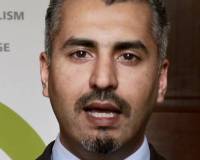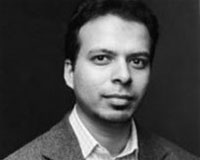Security delays launch of Muslim counter-terror group
by - 23rd April 2008
 Strict security delayed the launch of the world’s ‘first Muslim counter-extremism organization’, the Quilliam Foundation, at London’s British Museum yesterday.
Strict security delayed the launch of the world’s ‘first Muslim counter-extremism organization’, the Quilliam Foundation, at London’s British Museum yesterday.
Hundreds of invited journalists, academics and politicians were kept waiting for over an hour while ID was scrutinised for an event that had received threats over the weekend. Celebrity convert Jemima Khan admitted she had ‘wobbled’ over making her appearance because of threats.
The Foundation, funded by private donors, aims to create a distinctively British Islam, that revives a more mystical European tradition which the founders believe had its apogee in medieval Spain. Both the Director Maajid Nawaz and co-founder Ed Husain are former Hizb ut-Tahrir intellectuals, and admitted at the event that they incited hatred and murder – and regret it.
Dubbed misleadingly as ‘neo-cons’ by some leading British Muslims like Azzam Tamimi – who is backing Ken Livingstone’s mayoral candidacy - they have seized the moral high ground for a new post-al Qaeda Islam.
The liberal establishment was out in force yesterday, backing the movement. An assortment of atheist and liberal English peers, including Paddy Ashdown and Timothy Garton Ash spoke from the platform or sent messages. Concerned Sufi and moderate Muslim sheikhs from Eire and the US gave their blessing to what many described as ‘brave’ and overdue.
Dr Ali al-Saleh al Najafi, Imam of Milltown Islamic Centre in Dublin echoed many when he said: ‘You have done what we should have done a long time ago. We have new hope today to save our youth from real disaster awaiting them. We haven’t done enough. We need to do a lot of things to save our sons and daughters from the threat of extremism, violence and terrorism. We who are Muslims need to carry more responsibility because it is done in the name of Islam. Our problems began when we judged this society. We need to judge ourselves and our understanding of Islam.’
Sheikh Abdul Aziz al-Bukhari, head of the Sufi Naqshbandi in Palestine who pioneered the Jerusalem Peace Initiative, and is directly descended from the hadith compiler, Muhammad bin Ismail al-Bukhari, said: ‘There are more problems here with the young generation and their identity, than we have in Jerusalem.’
Gill Hicks, 7/7 bomb blast survivor who lost both legs in the atrocity, sent a message of support and Rachel North, another survivor bravely spoke of the ‘dark and screaming’ on the Piccadilly Line tube train when no one stampeded, or trod on one another but held hands with strangers of whatever race or religion - and called instead for calm.
She said it was a picture of hope for the future, one in which an ‘Islam with its message of peace is not the enemy but is part of the solution.’
Maajid Nawaz apologised to her for his part in the atrocities, which killed 26 people on Rachel’s carriage alone, and injured 100 more.
As head of Hizb-ut-Tahrir in Newham and Student Union President at Newham College, he was imprisoned and tortured in Egypt after going there to recruit for HT, and later released through the campaigning efforts of a Christian member of Amnesty International, who spoke at the event. He came out of the movement – which is still not banned in Britain, despite being banned in much of the Muslim world - in 2007. In a paper published for the launch, he described the ideology of HT and how it had created an atmosphere of hatred that eventually led to the murder of a Nigerian student on the East Ham campus, by a Somali Muslim man who was later convicted of the murder.
‘He had been invited onto that campus by activists of Hizb ut-Tahrir on the campus, myself and Ed Husain’ he admitted. ‘We saw the seeds we planted grow into the terror you witnessed first hand, and we felt we had to do something to reverse the tide.’
 Co-founder Ed Husain, author of the ground-breaking The Islamist said it was vital that a move by Muslims against extremism and Islamism was being pioneered in England rather than in the Muslim world ‘where thousands of people have been tortured for a thousand reasons.’ Muslims had to draw on their ‘Spanish heritage’, he said. ‘Said Qutb was tortured in an Egyptian gaol, - and it ended up with al-Qaeda.’ The Foundation would have repercussions around the globe, he believed.
Co-founder Ed Husain, author of the ground-breaking The Islamist said it was vital that a move by Muslims against extremism and Islamism was being pioneered in England rather than in the Muslim world ‘where thousands of people have been tortured for a thousand reasons.’ Muslims had to draw on their ‘Spanish heritage’, he said. ‘Said Qutb was tortured in an Egyptian gaol, - and it ended up with al-Qaeda.’ The Foundation would have repercussions around the globe, he believed.
Former Shadow Homeland Security Minister Patrick Mercer said it was inspirational to use former extremists to ‘turn’ the Islamist movement, as had happened with the IRA – and they deserved massive support.
The Foundation has published an eight-point agenda for tackling extremism called Pulling Together to Defeat Terror: Recommendations for Uprooting Islamist Extremism’. It includes reaching out to extremists particularly on campuses: students from some of the Britain’s most prestigious universities have gone on to commit terrorist atrocities and Islamist radicals are still ‘worryingly successful’ at FE colleges. They urge university authorities to ‘ensure prayer rooms do not become an Islamist underworld . . .’
They intend to establish ‘rehabilitation centres’ and tackle prison radicalisation by among other initiatives, ‘facilitating phone conversations, penpals, and buddy schemes with former extremist inmates of prisons in Riyadh, Sana’a and Cairo.’
The Foundation will attempt to reinvent a British Islam which, in the words of one speaker is ‘plural, harmonious and acknowledges the beauty in others.’
Dr Musharraf Hussain al-Azhari, Director of the Karimia Institute in Nottingham and President of the National Christian Muslim Forum said a combination of Arab nationalism, and Wahhabi fundamentalism has blighted Islam in the Middle East. And Indo-Pakistan movements with ‘their roots in hatred of British imperialism’ had led to the ‘naivety’ of the Taleban and blighted Islam in Britain.
In response to a question after the presentations about the separatist Deobandi sect, the Tablighi Jamaat, whose Indian founder took an oath of jihad against the British in 1908, and who are now planning to build Europe’s biggest mosque alongside the Olympic site in Newham, Maajid Nawaz said that any trends towards separatism would be addressed, but that Quilliam had no policy on specific mosques.
Ed Husain replied: ‘There are enough mosques.’
The Foundation is named after William – later Abdullah – Quilliam, son of a Liverpool watchmaker, who after his conversion from Christianity, founded Britain’s second mosque in 1889 – on Christmas Day.
www.quilliamfoundation.org
The Bishop of Liverpool, The Rt Revd James Jones is Patron of the fundraising committee to restore the mosque Quilliam built.
- Log in to post comments
